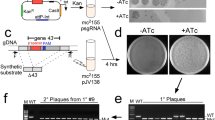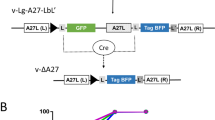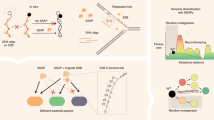Abstract
THOMAS et al.1 have constructed a mutant strain of bacteriophage λ (λgt.λC) which is especially well suited to studies involving the cloning of recombinant DNA molecules. Specifically, this bacteriophage, deleted of 15% of its genome, has only two EcoRI restriction endonuclease sites which, when cleaved, reduce the phage chromosome to three DNA fragments. The larger of these, the right- and left-hand arms of the chromosome, encode all functions necessary for lytic infection. The smaller, central fragment consisting of approximately 5.000 base pairs encodes the λ attachment site, the Int and Xis functions and a necessary part of the λ-generalised recombination system, but no genes necessary for phage propagation. Although left- and right-hand restriction fragments have all necessary λ genes, they seem to lack sufficient length of DNA for packaging into a viable phage particle1. This provides a powerful positive selection for recombinant DNA molecules consisting of isolated and rejoined right and left restriction fragments which have also incorporated a fragment of foreign DNA restoring the λ chromosome to viable size.
This is a preview of subscription content, access via your institution
Access options
Subscribe to this journal
Receive 51 print issues and online access
$199.00 per year
only $3.90 per issue
Buy this article
- Purchase on Springer Link
- Instant access to full article PDF
Prices may be subject to local taxes which are calculated during checkout
Similar content being viewed by others
References
Thomas, M., Cameron, J. R., and Davis, R. W., Proc. natn. Acad. Sci U.S.A., 71, 4579–4583 (1974).
Science, 188, 991 (1975).
Fowler, R. G., Degnen, G. E., and Cox, E. C., Molec. gen. Genet., 133, 179–191 (1974).
Wilson, J. H., and Kells, S., J. molec. Biol., 69, 39–55 (1972). Comer, M. M., Guthrie, C., and McClain, W. H., J. molec. Biol., 90, 665–681 (1974).
Schrenk, W. J., and Weisberg, R. A., Molec. gen. Genet., 137, 101–107 (1975).
Helling, R. B., Goodman, H. M., and Boyer, H. W., J. Virol., 14, 1235–1244 (1974).
Goldberg, A. R., and Howe, M., Virology, 38, 200–202 (1969).
Shimada, K., Weisberg, R. A., and Gottesman, M. E., J. molec. Biol., 63, 483–503 (1972).
Guarneros, G., and Echols, H., Virology, 52, 30–38 (1973).
Zissler, J., Signer, E., and Schaefer, F., The Bacteriophage Lambda (edit. by Hershey, A. D.), 455–468 (Cold Spring Harbor Laboratory, New York, 1971).
Sternberg, N., J. molec. Biol., 76, 1–23 (1973).
Murray, N. E., and Murray, K., Nature, 251, 476–481 (1974).
Author information
Authors and Affiliations
Rights and permissions
About this article
Cite this article
ENQUIST, L., TIEMEIER, D., LEDER, P. et al. Safer derivatives of bacteriophage λgt.λC for use in cloning of recombinant DNA molecules. Nature 259, 596–598 (1976). https://doi.org/10.1038/259596a0
Received:
Accepted:
Issue Date:
DOI: https://doi.org/10.1038/259596a0
Comments
By submitting a comment you agree to abide by our Terms and Community Guidelines. If you find something abusive or that does not comply with our terms or guidelines please flag it as inappropriate.



